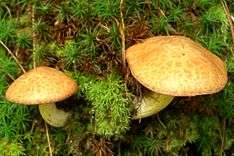Suillus subaureus
| Suillus subaureus | |
|---|---|
 | |
| Scientific classification | |
| Kingdom: | Fungi |
| Division: | Basidiomycota |
| Class: | Agaricomycetes |
| Order: | Boletales |
| Family: | Suillaceae |
| Genus: | Suillus |
| Species: | S. subaureus |
| Binomial name | |
| Suillus subaureus (Peck) Snell (1944) | |
| Synonyms[1] | |
Suillus subaureus is a species of bolete fungus in the family Suillaceae. It is found in North America, where it associates with deciduous trees. Originally described in 1887 by Charles Horton Peck,[3] it was transferred to genus Suillus by Wally Snell in 1944.[4] Fruitbodies are pale yellow—reflecting its specific epithet subaureus, which means "somewhat golden yellow". The spore print is olive brown. Spores are smooth and inamyloid, and measure 7–10 by 2.7–3.5 µm.[5] Ithas also been recorded in Taiwan.[6]
See also
References
- ↑ "GSD Species Synonymy: Suillus subaureus (Peck) Snell". CAB International. Retrieved 2015-08-06.
- ↑ Singer R. (1938). "Sur les genres Ixocomus, Boletinus, Phylloporus, Gyrodon et Gomphidius". Revue de Mycologie. 3: 35–53.
- ↑ Peck CH. (1886). "Report of the Botanist (1885)". Annual Report on the New York State Museum of Natural History. 39: 30–73 (see p. 42).
- ↑ Slipp AW, Snell WH. (1944). "Taxonomic-ecologic studies of the Boletaceae in northern Idaho and adjacent Washington". Lloydia. 7 (1): 1–66.
- ↑ Smith AH, Weber NS. (1980). The Mushroom Hunter's Field Guide. University of Michigan Press. p. 100. ISBN 0-472-85610-3.
- ↑ Yeh K-W, Chen Z-C. (1980). "The boletes of Taiwan" (PDF). Taiwania. 25 (1): 166–184.
External links
This article is issued from Wikipedia - version of the 10/26/2016. The text is available under the Creative Commons Attribution/Share Alike but additional terms may apply for the media files.